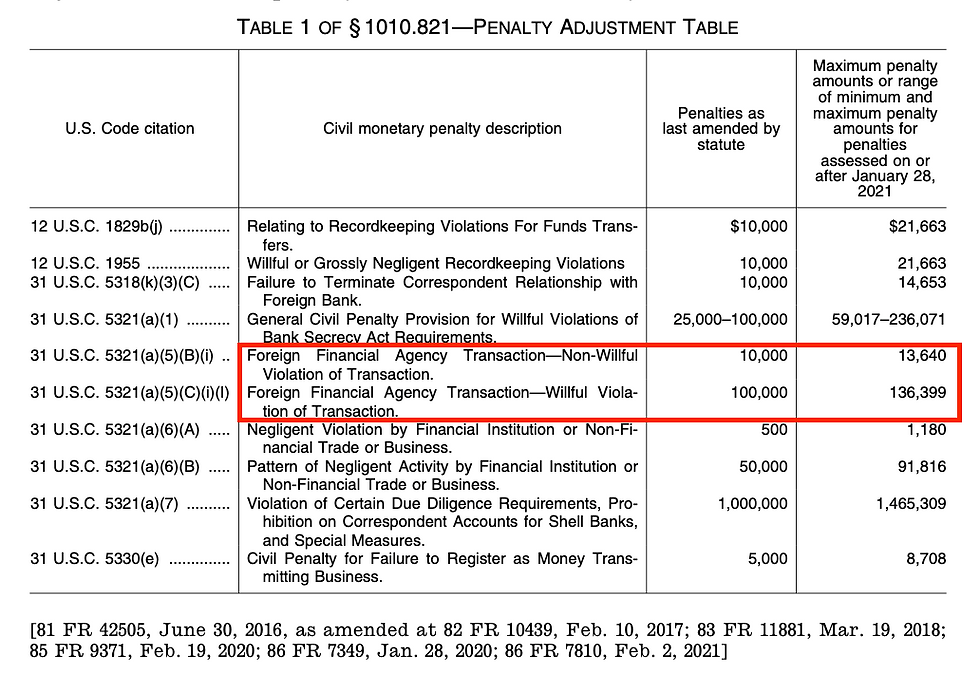FBAR (Foreign Bank Account Reporting)
- Sharon Choi, CPA

- Dec 15, 2023
- 3 min read

Purpose of the FBAR
U.S. persons maintain overseas financial accounts for a variety of legitimate
reasons including convenience and access. Foreign financial institutions may
not be subject to the same reporting requirements as domestic financial insti-
tutions. The FBAR is used by the U.S. government to identify persons who may
be using foreign financial accounts to circumvent U.S. law. FBAR information
can help identify or trace funds used for illicit purposes or identify unreported
income maintained or generated abroad.
Who Must File the FBAR?
A U.S. person must file an FBAR if they have a financial interest in or signa-
ture or other authority over any financial account(s) outside the U.S. and the
aggregate amount(s) in the account(s) exceeds $10,000 at any time during
the calendar year.
Who is a U.S. Person?
A “U.S. person” means:
• A citizen or resident of the United States;
• An entity created, organized, or formed in the United States or under the
laws of the United States, any State, the District of Columbia, the Territories
and Insular Possessions of the United States, or the Indian Tribes. An
“entity” includes but is not limited to, a corporation, partnership, trust, and
limited liability company; or
• An estate formed under the laws of the United States.
Disregarded Entities: U.S. persons that are disregarded entities for tax purposes
may need to file an FBAR. The federal tax treatment of an entity doesn’t affect
the entity’s requirement to file an FBAR. FBARs are required under a Bank
Secrecy Act provision of Title 31, not under any provision of Title 26 (Internal
Revenue Code).
• U.S. Resident: To determine if a person is a resident of the United States, apply
the residency tests in Section 7701(b)(1)(A)(i)-(iii) of Title 26 of the United States
Code (USC). When applying the residency tests, the United States includes
the States, the District of Columbia, all U.S. territories and possessions (i.e.
American Samoa, the Commonwealth of the Northern Mariana Islands, the
Commonwealth of Puerto Rico, Guam, and the U.S. Virgin Islands), and the
Indian lands defined in the Indian Gaming Regulatory Act.
Example: Chulsoo is a citizen of South Korea. He has been physically present in the U.S.
every day of the last three years. Because Matt is considered a resident under 26
USC Section 7701(b), he is a U.S. person for FBAR purposes.
Example: Soonhee is a permanent legal resident of the U.S. Soonhee is a citizen of the South Korea. Under a tax treaty, Soonhee is a tax resident of the South Korea and elects
to be taxed as a resident of the South Korea. BUT Soonhee is a U.S. person for FBAR
purposes. Tax treaties with the U.S. do not affect FBAR filing obligations.
Financial Account
Financial accounts include:
• Bank accounts such as savings and checking accounts, and time deposits,
• Securities accounts, such as brokerage accounts, securities derivatives
accounts, or other financial instruments accounts;
• Commodity futures or options accounts;
• Insurance or annuity policies with a cash value (such as a whole life
insurance policy);
• Mutual funds or similar pooled funds (i.e. a fund available to the public with
a regular net asset value determination and regular redemptions), and;
• Any other accounts maintained in a foreign financial institution or with a
person performing the services of a financial institution.
Example: Canadian Registered Retirement Savings Plan (RRSP), Canadian Tax-Free
Savings Account (TFSA), Mexican individual retirement accounts (Fondos para el
Retiro) and Mexican Administradoras de Fondos para el Retiro (AFORE) are foreign
financial accounts reportable on the FBAR.
Example: Foreign hedge funds and private equity funds are not reportable on the
FBAR.
Example: A foreign account holding virtual currency is not reportable on the FBAR
(unless it’s a reportable account under 31 C.F.R. 1010.350 because it holds report-
able assets besides virtual currency). These funds aren’t reportable at this time, per
FBAR regulations issued by FinCEN February 24, 2011, but FinCEN Notice 2020-2
indicates FinCEN’s intention to propose amending the regulations to include virtual
currency as a type of reportable account under 31 CFR 1010.350
Penalties for not filing FBAR
Up to $136,399 and 10 years in prison. See below for the Pently Adjustment Table on the U.S. Government website that dictates financial penalties, inflation and adjustments, and also the link explaining the penalties by IRS.





Comments